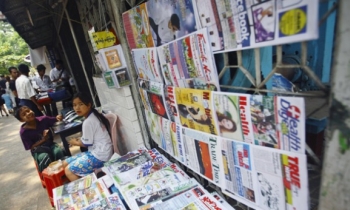The Chinese authorities, who last month unexpectedly dropped a state secrets case against a jailed researcher for The New York Times, have started an investigation period that could lead to reinstating the charges against him by early May, his lawyer said Monday.
The possibility of resuming the case undercuts speculation that withdrawal of the case last month was intended as a prelude to releasing the researcher, Zhao Yan. The timing also means that a final decision on how to proceed with the politically delicate case will be delayed until weeks after President Hu Jintao has returned from his visit this week to the United States.
Until now, prosecutors and other Chinese officials have refused to clarify the status of the case or even take telephone calls from the defense team. The new investigation period was disclosed Monday afternoon after one of Mr. Zhao’s defense lawyers reached a prosecutor on the telephone for the first time in weeks. The prosecutor said that in late March, days after the withdrawal of the case, the authorities had initiated a new six-week investigation.
At the end of that period in early May, investigators will decide whether to reinstate the charges. Technically there is still a chance that Mr. Zhao will be freed. But Mo Shaoping, the lead defense lawyer, said he also spoke Monday to a person in a higher office who indicated that the prosecution against Mr. Zhao would probably be “resumed.”
Mr. Zhao, 44, has been jailed for 19 months on charges of fraud and disclosure of state secrets to The Times. He has denied the charges, and The Times has said Mr. Zhao did not provide the newspaper with any state secrets. On March 17 a Beijing court granted a prosecution request to withdraw the case. The move prompted speculation that Mr. Zhao might be released, possibly in a good-will gesture in advance of President Hu’s trip.
Instead, Mr. Zhao, an employee of the Beijing office of The Times, remained in jail even though there no longer were any charges against him. Now, one question is whether prosecutors used the withdrawal as a procedural maneuver to delay a trial, which had been scheduled for late March. Legal experts say Mr. Zhao should have been released after the withdrawal, regardless of any intention to reopen the case.
“This is a man who has been held for a long time after the indictment was withdrawn,” said John Kamm, a human rights campaigner, whose Dui Hua Foundation, based in San Francisco, works to free political prisoners in China. “I think it is a terrible black eye for the Chinese justice system. It’s a terrible black eye because there is no transparency, there is no accountability.”
Mr. Zhao’s case has brought widespread criticism on China from international human rights groups at a time when China is emphasizing the development of its legal system. The United States, arguing that the case lacks merit, has called on China to release Mr. Zhao. President Bush has twice made a personal appeal on his behalf.
Mr. Hu is spending four days in the United States this week for an important diplomatic visit that includes a White House meeting with Mr. Bush. In years past, China has often released at least one high-profile political prisoner in advance of a presidential visit.
But as yet China has not released anyone and has refused to discuss Mr. Zhao. The Chinese news media are forbidden to report on the case. A Foreign Ministry spokesman has said China will act “according to law.”
“We are not authorized to speak to you,” Wang Zhiqin, the Beijing prosecutor in charge of the case, said Monday afternoon. She refused to confirm that the case was going forward.
For weeks there have been indications that local prosecutors no longer have decision-making authority over the case. Employees in the prosecutors’ office have told Mr. Zhao’s family that higher authorities would decide his fate. Mr. Kamm said decisions were probably being made at high levels of the Communist Party outside the framework of the legal system.
Mr. Zhao’s arrest is tied to an article in The Times on Sept. 7, 2004, that disclosed that former President Jiang Zemin had offered to relinquish his last leadership position, as head of the military. The article, which proved accurate when Mr. Jiang later quit, infuriated top leaders, who forbid any news coverage of the inner workings of the party. A high-level investigation was begun to determine the source of the leak.
Mr. Zhao was arrested 10 days after the article was published. Once a prominent Chinese journalist, Mr. Zhao started working for The Times in April 2004. If convicted of disclosing state secrets, he could face at least 10 years in prison.
Chinese law dictates that if prosecutors withdraw a case, they must present new evidence in order to file the same charges again. When the case was withdrawn, Mr. Mo initially equated the decision to a finding of innocence and predicted Mr. Zhao’s immediate release. Mr. Mo has since accused prosecutors of blatantly distorting the law.
“It is absolutely against the law that they kept him after dropping the case,” the lawyer said in an interview on Monday. “Even if they had wanted to reopen the case, they should have released him after they withdrew the case.”









